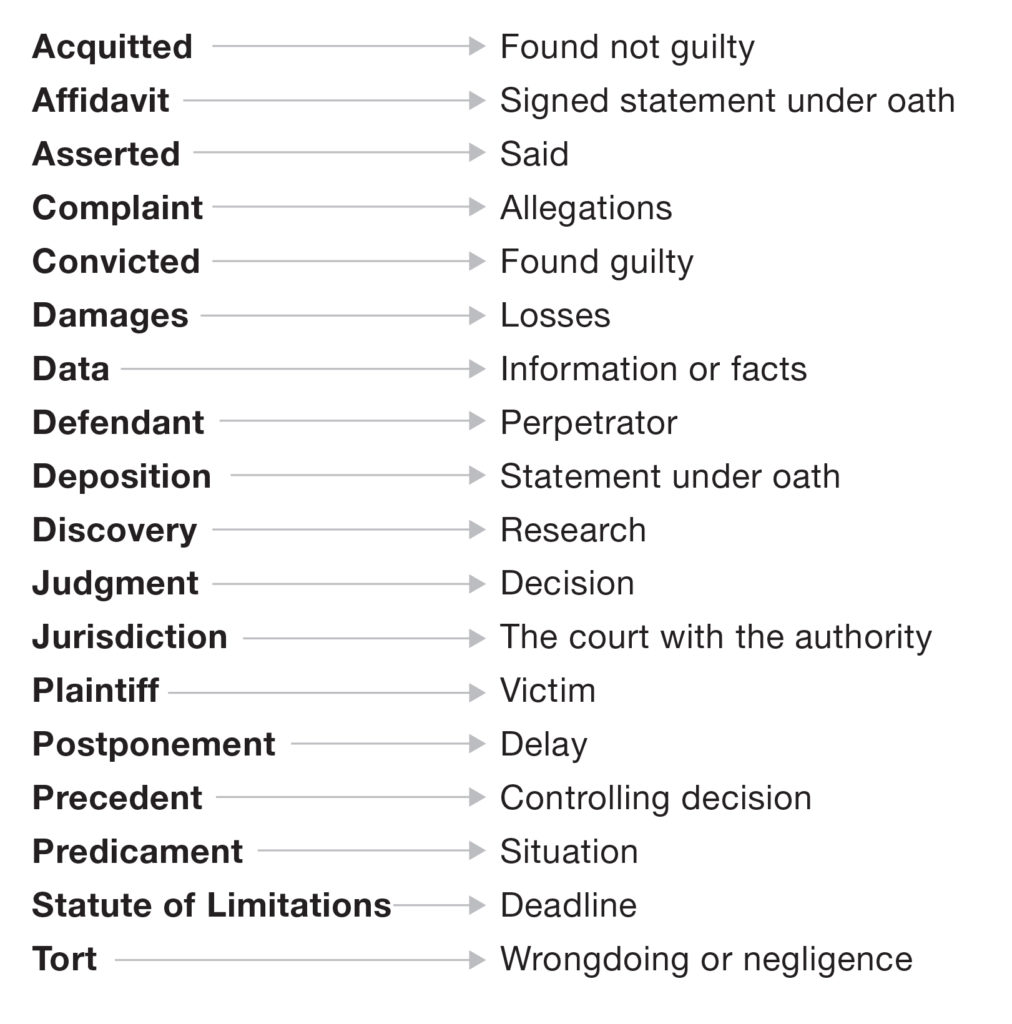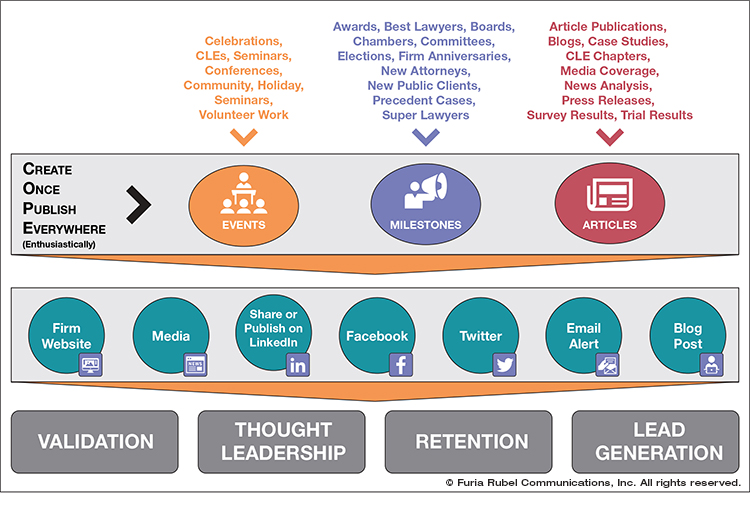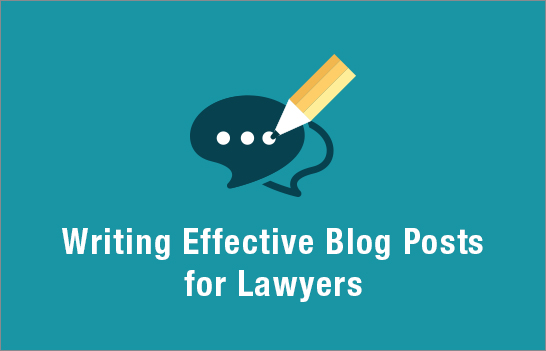Writing Effective Blog Posts for Lawyers
 Lawyers and law firms derive many benefits from effective blogging. Benefits of blogging include business development, client and referral relations, community relations, internal communications, issue advocacy, marketing and public relations, media relations, message management, networking, publicity, reputation management, and thought leadership.
Lawyers and law firms derive many benefits from effective blogging. Benefits of blogging include business development, client and referral relations, community relations, internal communications, issue advocacy, marketing and public relations, media relations, message management, networking, publicity, reputation management, and thought leadership.
Before you start a blogging initiative, however, it’s important to first identify what you want to accomplish through blogging and then take the time to write effective and engaging blog posts that will help you meet those goals.
Types of Blog Posts
Two types of blog posts are most effective for lawyers: 1) timely topic posts about court decisions, legislative rulings, breaking news, etc., and 2) evergreen topic posts that are general in nature and can be posted at any time and still be relevant to your target audience.
Both types of posts are important for effective relationship development and legal marketing. In addition, all blogs should be focused on key takeaways for your target audience.
Timely topics: If you are going to blog about topics that are current, you must write the posts and publish them in a timely manner. If you’re talking about a decision by the Supreme Court and how it affects your target audience, you want to get it written and posted within 24 to 72 hours of the decision (preferably closer to the 24-hour mark). Otherwise, it’s no longer news and will garner less readership.
Evergreen topics: Attorneys often overlook these, but evergreen topics are extremely important to include in your blogging plan. These usually address issues that don’t change frequently and that you deal with every day so can be discussed in general terms. Think about the questions that your clients ask you regularly (aside from “how much will it cost?”). Your answers make for great evergreen blog topics. Evergreen blog content can be shared repeatedly over time, generating three and four times the amount of traffic that most breaking news posts will.
How to Identify Blog Topics of Value to Your Target Audience
Blogging does not have to be a daunting task. Since blog posts usually address a single topic in a short and concise manner, it should be easy to come up with topics to blog about that serve your target audience with information about your areas of practice to establish you as an authority. Here are some ways to come up with topics:
- Keep a notepad next to your phone or keep notes on your mobile device. Every time a colleague, client or prospect asks you a substantive question, write it down. The answers to those questions are almost always worthy of blog topics.
- If you’re a transactional attorney, consider every transaction for a blog topic. For example, every contract has many clauses. Contract attorneys can write short blogs about the benefits and/or pitfalls of various contract clauses such as termination clauses, non-compete clauses, liability clauses, etc.
- Review your memos of law and briefs for substantive (non-fact-specific) content that can be edited and turned into blogs.
- Write about experiences in generic terms.
- Set up free Google Alerts on specific topics in your area of expertise and review them daily. If something is breaking in the news, you’ll be on top of it.
- Utilize materials from CLEs and seminars you have presented for blog content.
- Have someone record presentations you give and then have them transcribed (or simply use the app, TEMI, with an iPhone or iPad, to capture an audio file and transcribe it electronically.) Edit the transcription into one or more blog posts.
Consider Search Engine Optimization When Blogging
- Draft a title that describes your topic in the way people might search for the information included in the blog post.
- Use keywords in a natural way that describe your topic, your area of practice, the geographic regions within which you practice law, the state, etc.
- Use the words “lawyer” and “attorney” interchangeably, since people search for both. For example, “business lawyer” and “business attorney.”
- Use specific keywords that your target audience may be searching for. For example, “Commercial real estate and residential real estate can be subject to real estate transfer taxes in James County.” Don’t just say commercial and residential real estate, use the full phrases.
Guidelines for Writing Effective Legal Blog Posts
- Write about a single topic.
- Stay away from providing legal advice. Be general. Give opinions only when it is in the firm’s best interest.
- State exactly what you would want quoted if your blog is read by the media – repeat your key points.
- Each blog post should range from 800 to 2,000 words. Long-form content has become more credible according to Google algorithms and will support your firm’s SEO efforts.
- Use bullets and lists as often as possible.
- Link to other sources outside of your law firm’s expertise.
- Avoid legalese. It will not be readily understood by most of your reading audience. Use layman’s terms or explain the legal terms. For example, if you’re writing a blog about leases and you are talking about the rights of the lessor, then use the words renter and lessor. Even when your audience consists of other attorneys, simple, direct language is preferred. Here are some examples of alternatives you can use in place of legalese:

Tips for Writing Effective and ‘Sticky’ Blog Headlines
- Write as if it’s front page news.
- Tell a memorable story.
- Keep it short and powerful.
- Use active voice and action words.
- Include impactful data whenever possible.
- Answer: Why should your reader care?
- Draft the headline last.
The Importance of Sharing Your Blog in Multiple Channels: C.O.P.E.
Blogging is one form of content marketing which supports the dissemination and sharing of information created for or on behalf of the law firm in order to establish validation, thought leadership, retention, and lead generation. The illustration below addresses how attorneys can capitalize on blogs using the COPE philosophy: Create Once, Publish Everywhere / Enthusiastically.

Gina F. Rubel, Esq. is the professional that law firm leaders call for high-stakes public relations, media training, crisis planning, and incident-response support including high profile litigation media relations. An attorney and law firm PR expert, Gina leads Furia Rubel Communications, Inc., an agency supporting law firm growth through integrated legal marketing, public relations, and content marketing. Contact her at (215) 340-0480, gina@furiarubel.com or @GinaRubel.
